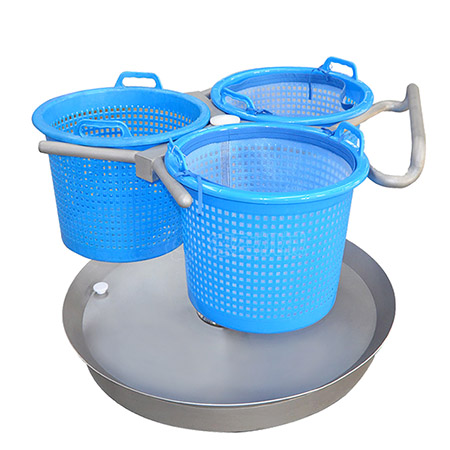Trolley turntable, also known as a trolley rotating platform or simply a turntable, is a device designed to rotate trolleys or carts smoothly and efficiently. It consists of a circular platform mounted on a set of bearings, allowing it to rotate horizontally. The turntable typically has a low-friction surface to minimize resistance and ensure easy rotation.
Here's a description of a typical trolley turntable:
Circular Platform: The turntable features a circular surface, usually made of sturdy materials such as steel or plastic, ensuring durability and stability. The platform is designed to accommodate the size and weight of various trolleys used in difaferent industries.
Bearings: Underneath the platform, there are bearings that enable smooth rotation. These bearings reduce friction, allowing the turntable to rotate effortlessly when a trolley is placed on it.
Rotation Mechanism: Trolley turntables can be manually rotated or motorized for automated operation. In manual versions, users can push or pull the trolley to rotate it, while motorized turntables use an electric motor to achieve rotation. Motorized turntables often come with controls that allow users to adjust the speed and direction of rotation.
Applications: Trolley turntables find applications in various industries, including retail, manufacturing, logistics, and food service. In retail environments, they are used for product displays, allowing customers to easily access items from different angles. In manufacturing and logistics, they facilitate the smooth transfer of goods between different workstations or conveyor systems. In the food service industry, they are used for efficient food preparation and service, enabling chefs and servers to access ingredients or dishes conveniently.
Benefits: Trolley turntables improve efficiency and reduce the need for manual handling. They enhance workflow by eliminating the need to reposition trolleys manually, saving time and effort for employees. Additionally, they contribute to a safer working environment by minimizing the risk of strain or injury associated with heavy trolley movement.
Overall, trolley turntables are valuable tools in various industries, streamlining processes and enhancing productivity.

Q&A
Yes, trolley turntables can be integrated into automated systems. Motorized turntables are designed for seamless integration into conveyor systems and other automated processes. They can be controlled electronically, allowing for precise rotation and synchronization with other equipment, enhancing the overall efficiency of automated workflows.
Trolley turntables are designed for durability and low maintenance. Regular cleaning and periodic lubrication of the bearings ensure smooth rotation. The robust construction of the turntable components minimizes wear and tear, contributing to their long lifespan. Maintenance requirements may vary based on usage intensity and environmental conditions.
Yes, trolley turntables are engineered to handle heavy loads. Their robust construction and high-quality materials allow them to support significant weight capacities. Manufacturers provide load capacity specifications, guiding users to select the appropriate turntable for their specific application needs, ensuring safe and efficient operation under heavy loads.
Trolley turntables are designed with safety in mind. They often feature rounded edges and smooth surfaces to prevent injuries during operation. Some models come with locking mechanisms to secure the trolley in place during rotation, ensuring stability and preventing accidents. Additionally, motorized turntables may have emergency stop buttons and safety sensors to enhance overall safety in automated systems.
Yes, trolley turntables can be used in cleanroom environments. Some models are specifically designed with materials that meet cleanroom standards, ensuring they are suitable for use in controlled environments with strict cleanliness requirements. These turntables are easy to clean and maintain, making them ideal for industries such as pharmaceuticals, electronics, and aerospace, where cleanliness is crucial.
Choosing the right trolley turntable involves considering factors such as load capacity, size, rotation mechanism (manual or motorized), and specific application requirements. It is essential to assess the weight and dimensions of the trolleys, the available space, and the desired rotation speed. Consulting with a knowledgeable supplier or manufacturer can help determine the most suitable trolley turntable for your specific needs.
Yes, trolley turntables are cost-effective investments for businesses. By streamlining material handling processes, reducing manual labor, and minimizing the risk of injuries, they contribute to increased productivity and efficiency. The time saved and improved workflow often result in a quick return on investment, making trolley turntables a practical choice for businesses seeking enhanced operational efficiency.
Certainly, trolley turntables are versatile and can be adapted for specialized applications like assembly lines. In assembly processes, turntables facilitate the smooth transfer of parts and components between workstations, allowing workers to access items from different angles easily. Integrating turntables into assembly lines can improve workflow efficiency, enhance worker ergonomics, and contribute to the overall productivity of the assembly process. Manufacturers often provide customizable options to meet the specific requirements of assembly line applications, ensuring seamless integration into the production process.
| Technical Parameters | |
| External dimensions | (diameter Φ x height) 950 x 765 mm |
| Contact height | 700mm |